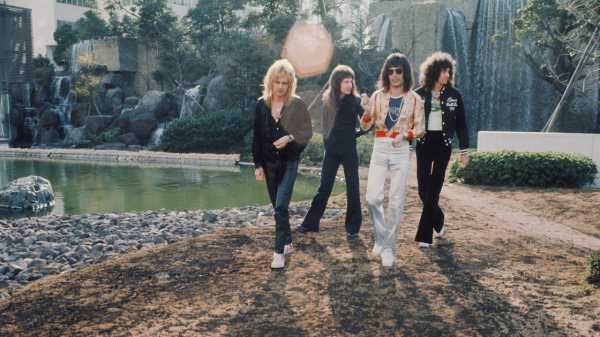
There are people alive who do not enjoy Queen—who find the band too indulgent or too audacious—but I believe in my heart that those people are simply adrift. The critical conversations about Queen tend to linger on Freddie Mercury, Queen’s virtuosic and eternally strutting vocalist, but all four founding members—Mercury, the guitarist Brian May, the bassist John Deacon, and the drummer Roger Taylor—were extraordinary musicians. The band’s discography is theatrical, infectious, intemperate. For me, listening to almost any Queen record produced between 1973 and 1986 incites a frenzied gladness to be alive. Their best songs work on me instantly.
It has grown unfashionable, in certain circles, to trumpet the ferocity and inventiveness of classic rock, in part because the genre has been heralded to death already, and in part because so much of its outsized lore has to do with white men getting rich and behaving poorly. Yet there was an era, beginning in the early nineteen-seventies, in which rock bands were routinely writing and recording hugely weird, extravagant, and exploratory songs. I suspect some of these—“Ziggy Stardust,” “Stairway to Heaven,” “Shine On You Crazy Diamond”—will take me a lifetime to metabolize, no matter how often they are played on the radio or at Guitar Center. Sometimes, when it is late at night and I am looking for purchase—any warm hand to hold—I’ll cue up a live performance of Queen doing “Under Pressure” from 1981. A few months earlier, David Bowie had flown to Mountain Studios, in Montreaux, Switzerland, to record backing vocals for the band’s tenth album, “Hot Space.” Those sessions yielded “Under Pressure.” About two minutes and forty seconds into the performance—it was the first time that Queen had played the song live—Mercury arrives at the frantic third verse:
Can’t we give ourselves one more chance?
Why can’t we give love that one more chance?
Why can’t we give love, give love, give love, give love
Give love, give love, give love, give love, give love?
I don’t think it’s hyperbolic to describe that half-minute or so as truly perfect, in the purest sense of the word—complete, beyond improvement. Mercury could be mischievous (in interviews, you can see a little cunning around the eyes, and in the way his face stretched so easily into a devious grin), but there are moments, particularly when he sings about love, that he is almost unbearably earnest. “Under Pressure” is sympathetic to the impossibility of ever effectively managing one’s human relations, yet it demands optimism, some faith in the beauty of the whole enterprise. Why can’t we give love that one more chance?
“Bohemian Rhapsody,” a new bio-pic about Queen, stars Rami Malek and a set of costume chompers as Mercury, and follows the band from its inception in London, in 1970, through the nineteen-eighties. Malek is charismatic and convincing, though I found myself increasingly befuddled each time he started singing. (I later learned that the soundtrack blends Mercury’s voice, Malek’s voice, and an unnamed singer’s voice into an odd and cheap-sounding mélange.) It’s a bizarrely anodyne film, too feel-good to be convincing. Mercury was, by all accounts, a man of considerable appetites, which the script acknowledges only obliquely—a coffee table smeared with cocaine, a loaded glance outside a truck-stop toilet, a late-night goose. “I think the excess leaked out from the music into life and became a need,” Brian May told Mojo, in 1999. “I think it came close to destroying us all.” Yet the film merely hints at carnage—a terse argument, a couple of missed phone calls, a few flares of ego.
Mercury, who was born Farrokh Bulsara, in Zanzibar, died in 1991, of complications from AIDS. (He was bisexual, but mostly kept his romantic relationships private.) The film both begins and ends with the band’s appearance at Live Aid, a charity concert organized by Bob Geldof and Midge Ure, in 1985, to provide relief for the Ethiopian famine. More than thirty years later, Queen’s twenty-minute set is still spoken of as one of the greatest rock-and-roll performances ever. Mercury jogs out, kicking his legs at the knees, like a cheerleader pom-pom-ing onto a football field at halftime. He was thirty-eight years old, thin, and wearing a low-cut white tank top, a pair of high-waisted jeans, and a black mustache. A studded armband was lashed around his right bicep. The band members assume their instruments; Mercury sits down at the house piano. He is plainly aware of the eyeballs fixed on him—the seventy-two thousand people crammed into Wembley, the global television audience of nearly two billion. Most of the U.K. crowd had already been there for seven hours, though when the camera spins around to catch some reaction shots, there’s no fatigue evident on their faces. The crowd is a pink sea, hands in the air, euphoric. Mercury blows them kisses.
There’s a wobbly feeling that can arise in the gut after bearing witness to an action that seems cosmically preordained. It’s impossible to watch Mercury perform and not think, He was built for this. Queen opened its Live Aid set with “Bohemian Rhapsody,” which Mercury wrote in 1975, for the band’s fourth record, “A Night at the Opera.” It is easily one of the strangest and most complicated pop singles ever recorded, a million different songs at once, all of them nuts: a piano ballad, a hard-rock jam, an absurdist opera, “Scaramouche,” vocals in stereo, a gong. Still, two and a half minutes into the second section, when Mercury sings, “I don’t wanna die / Sometimes wish I’d never been born at all,” the song reaches another plane. Whatever Mercury taps into in those moments, it doesn’t feel like an intellectual exercise. It doesn’t feel ambitious. May’s elegant, yearning guitar solo underlines the sentiment: life is hard.
The song was re-popularized in 1992, after it was used in the opening scene of the “S.N.L.”-derived movie “Wayne’s World,” in which Wayne, Garth, and some hesher buds head-bang around Aurora, Illinois, in a flame-accented Dodge Dart. Mike Myers, who wrote and stars in “Wayne’s World” (he also has a small, winking part in “Bohemian Rhapsody,” playing a record executive who bets against the band), has said that the studio pressured him to instead use a Guns N’ Roses song in the scene, but he stood fast. That same year, “Bohemian Rhapsody” was re-released as a single, and made it to No. 2 on the Hot 100. Its resurgence makes sense, in a way—the song exists almost wholly out of time. So much contemporary pop music feels tethered to the present moment—one style of music becomes popular, and suddenly every artist within earshot assumes the same pose, and while plenty of things are good, nothing is jarring, nothing is unwieldy, nothing seems impossible. Queen often felt impossible. It is the thing that I love and miss most about the band.
Sourse: newyorker.com






